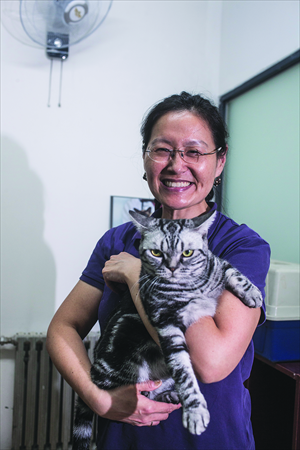Pet love

Mary Peng, co-founder of the International Center for Veterinary Services. Photo: Li Hao/GT
Mary Peng isn't planning to join the growing line of longtime expats turning their backs on China. Despite farewell letters penned by disgruntled foreigners getting plenty of exposure in the media, she feels much of the "expat exodus" is overhyped.
"They all talk about lots of expats leaving," she said. "Well, I'm not leaving."
Peng first visited China in 1980 shortly after the normalization of Sino-US ties. Expat life has improved dramatically since she returned to China in 1991, she said.
Peng is best known in Beijing's expat community as a pet welfare advocate. Her love for pets inspired her in 2006 to co-found the International Center for Veterinary Services (ICVS), China's first foreign-owned animal hospital.
Aside from offering pet owners world-class healthcare services for their animals, the Chaoyang district clinic also educates the public about pet healthcare.
As current president of the International Newcomers' Network (INN), a Beijing expat support network established in 1994, Peng also helps organize events and share her knowledge to create a strong sense of community among foreigners, who often feel like outsiders when they settle in China.
Love of pets
Peng's own experience as a pet owner in Beijing motivated her to open ICVS. Prior to its launch, she worked at an advertising agency and had only basic knowledge about pet healthcare.
Her furry friend when she came to Beijing nearly 20 years ago was a cat, Boo Boo, which Peng adopted in the city in 1994. One of her first struggles was getting Boo Boo vaccinated and spayed, both uncommon procedures in China at the time.
"Back then, people still raised animals mostly for consumption," she said. "The idea of a companion animal wasn't popular."
In lieu of vet clinics, Peng knew her best chance for treating Boo Boo was visiting Beijing Agricultural University. She recalls even taxi drivers didn't know whether the university, which specialized in livestock medicine, would provide such services for her feline companion.
"People brought their livestock to the university," she said. "I was the only one there with a cat."
Peng's experience prompted her to consider filling the niche market of pet healthcare in Beijing. However, her plans were put on hold when she returned to the US.
In 2003, Peng came back to Beijing with Boo Boo. She was surprised to find that little had changed regarding pet healthcare despite soaring pet ownership.
"It had been 10 years, but nothing had changed," she said.
She worried that Boo Boo, like most aging cats, would depend more on healthcare services. Peng revisited her idea of recruiting veterinarians and launching her own clinic.
Awareness through education
ICVS caters to more than just pets, Peng said, noting they also try to educate the community on responsible pet ownership.
Even though few people who came to her clinic were knowledgeable about pet healthcare when she opened ICVS, the situation has improved over time, Peng said.
"We get phone calls every day from people asking about basic pet healthcare information, such as what vaccines to give a newly adopted stray dog or puppy from a neighbor's dog," she said.
The situation is definitely better than the 1990s, when most people informed about pet healthcare worked at the agricultural university. Now, Beijing is home to nearly 300 vet clinics.
Moreover, Peng said people's attitudes have also evolved about pets.
"People at first were really curious about the different types of animal breeds. After their initial curiosity, they really started to care about the animals and form a special animal-people bond," she said.
ICVS gradually expanded its scope from cats and dogs to a wide variety of pets, including reptiles and birds. Besides treating animals, the hospital has also proposed strategies, such as the "neuter-trap-return" method, to humanely rein in the city's stray cat population.
Speaking about current strict regulations on ownership of big dogs in Beijing, Peng called for greater emphasis on educating the public, especially dog owners, to alleviate concerns.
"There is no scientific evidence that large dogs are fiercer," Peng said. "Dog owners should be educated on getting their dogs vaccinated and leashed all the time."
Banning big dog breeds within certain parts of the city has been the government's approach to addressing public concerns, Peng noted, before reaffirming that she believes the root of the issue lies in education.
Building a sense of community
Aside from her contribution to local pet healthcare, Peng's role as INN president has allowed her to become a leader in the expat community.
She joined the organization in 2004, although initially felt embarrassed because she had been in China for more than a decade and could hardly be dubbed a "newcomer."
"But my friend said, 'Mary, it's OK. We want people who have been here for a long time. If everybody was new, nobody would know anything,'" Peng said.
The group holds weekly meetings in different districts of Beijing and monthly activities for both newcomers and veteran expats.
They discuss topics and exchange useful tips, such as where to find certain foods in Beijing, how to deal with the city's pollution and how to take a taxi or train.
Because of the transient nature of expats in Beijing, a lot of city knowhow comes and goes due to the regular turnover of foreigners, Peng said. Her aim is to provide a lasting support network to foreigners, no matter whether they are seasoned Beijingers or still finding their feet, and help build a sense of community.
"It is more about meeting friends and making friendships," Peng said of INN's mission. "You would not believe how rich and diverse the community is here."